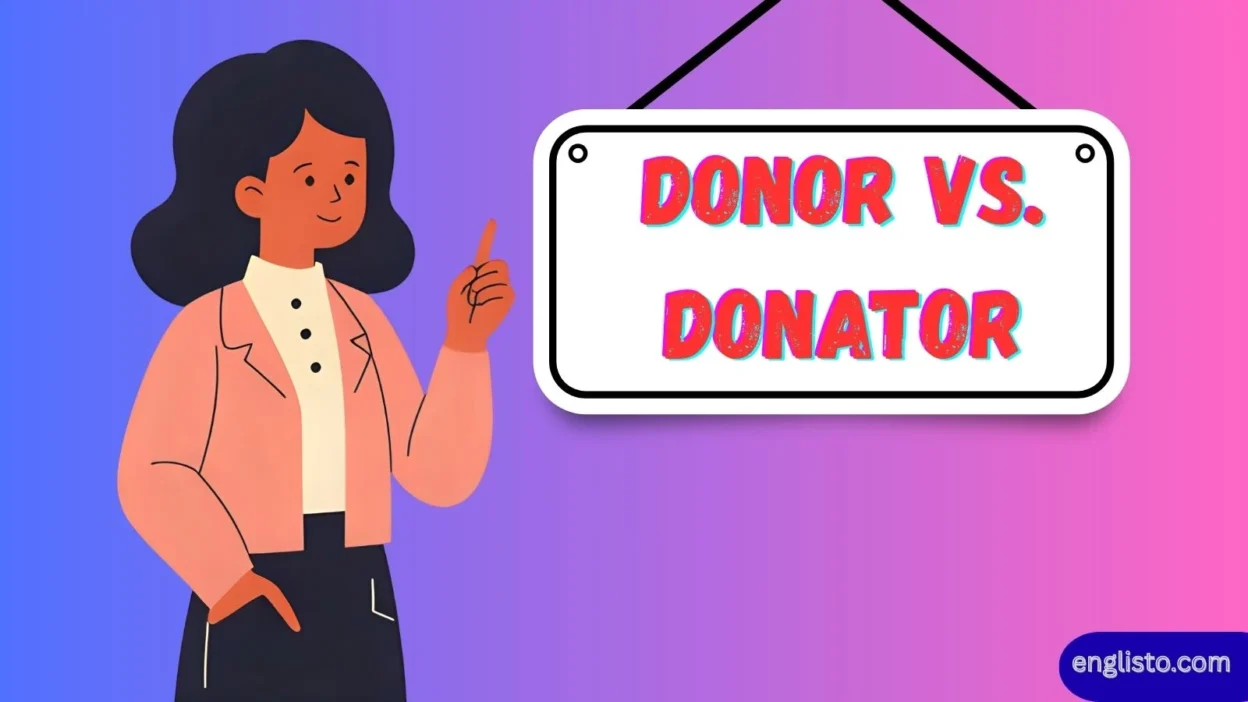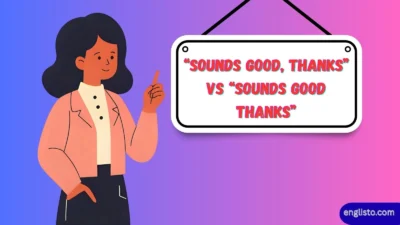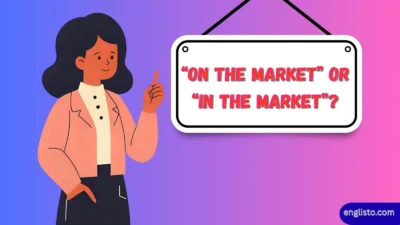Choosing the right word can make your writing sound professional, credible, and clear. When it comes to Donor vs. Donator, the difference may look small on the surface, but in modern English, one word is universally accepted while the other sounds awkward or outdated. If you’ve ever wondered whether you should write blood donor or blood donator, this guide breaks it all down for you.
We’ll explore grammar, history, real-life usage, examples, and even common mistakes. By the end, you’ll know exactly when, where, and why “donor” is preferred.
Origins of the Words: Donor vs. Donator
Both words come from Latin roots:
- Donare → “to give, to grant.”
- Suffixes -or and -ator both form nouns for people who perform an action.
But history shaped their usage differently.
| Word | First Recorded Use | Root + Suffix | Common Today? | Notes |
| Donor | Middle English (14th century) | Latin donare + -or | Yes | Widely accepted in formal, professional, and legal contexts. |
| Donator | 15th century | Latin donator | Rare | Considered archaic or regional, mostly historical or legal. |
Quick takeaway: Donor became the standard in modern English, while donator faded into obscurity.
Why “Donor” is Preferred in Modern English
There are several reasons donor rings more natural:
- Clarity: “Donor” instantly connects with blood donor, organ donor, donor funding.
- Professional tone: Used in medicine, law, fundraising, and academia.
- Accepted by dictionaries: Merriam-Webster, Collins, and OED all list donor as the main form.
- Universality: Across English-speaking countries, “donor” is the word of choice.
“Donator” can sound clumsy, old-fashioned, or even incorrect in professional writing.
The Subtle Difference Between Giving and Donating
Many people use giving and donating interchangeably, but context matters.
| Word | Implies | Examples |
| Giving | Informal, personal, may expect return | Giving a birthday gift, giving money to a friend |
| Donating | Charitable, philanthropic, no repayment expected | Donating blood, donating money to a non-profit |
Giving = broader, everyday use.- Donating = formal, charitable, altruistic act.
So while every donation is a gift, not every gift is a donation.
Synonyms of Donor and Donator
When writing, you don’t always want to repeat the same word. Here’s a table of synonyms.
| Category | Synonyms |
| Formal / Philanthropy | Benefactor, patron, philanthropist, sponsor |
| Casual / Everyday | Giver, supporter, backer, helper |
| Archaic / Rare | Donator, almoner, Maecenas |
Pro Tip: Avoid “donator” in modern writing unless you’re quoting history or legal texts.
Who Donates the Most to Nonprofits?
In the U.S. and globally, individuals remain the largest donors. According to recent reports:
- 81% of nonprofit contributions come from individuals and households.
- 14% from foundations.
- 5% from corporations and businesses.
Example:
- Wealthy households may give millions annually.
- Average households still play a huge role through consistent small donations.
- Companies contribute via corporate social responsibility programs, often tied to causes like food security or education.
Real-Life Usage: Donor in Medicine, Law, and Fundraising
- Medicine: “The hospital thanked the blood donors for saving lives.”
- Law: “The donor transferred property under the terms of the trust.”
- Fundraising: “Our organization relies on loyal donors to run sustainably.”
Notice how donor flows naturally, while “donator” would sound off in all these examples.
Making the Most of Online Donations
With digital fundraising becoming essential, nonprofits now see:
- 20% of donations coming online (as of 2020).
- Platforms like BiddingOwl and GoFundMe integrating raffles, auctions, and live events.
- Social media (Facebook, Instagram) making donation requests more accessible.
Having the right terminology—using “donor” not “donator”—is crucial for professionalism in online spaces.
How to Ask for Donations (Without Sounding Pushy)
Here are some effective strategies:
- Use social media with creative campaigns.
- Offer small thank-you gifts (custom mugs, T-shirts, plants).
- Personalize emails and messages—donors love recognition.
- Highlight the impact: “Your $50 donation provides school supplies for 10 children.”
Tip: Always call them “donors.” It sounds credible and professional.
Donator in Dictionaries: A Quick Look
Most modern dictionaries list donator as a rare or archaic synonym of donor.
- Oxford English Dictionary (OED): Marks “donator” as rare.
- Collins Dictionary: Notes usage has largely faded.
- Merriam-Webster: Lists it but points to “donor” as the preferred word.
So while it exists, it’s not the best choice for current communication.
Examples: How to Properly Use the Words
- Correct: “The anonymous donor gave $10,000 to the animal shelter.”
- Incorrect/Outdated: “The generous donator gave $10,000…” (technically valid, but sounds off).
- Neutral: “Several donors contributed blood for medical purposes.”
More Sentence Examples
- “Her father was an organ donor; his gift saved three lives.”
- “The campaign reached its fundraising goal thanks to hundreds of small donors.”
- “Some legal documents from the 15th century still use the word donator.”
Common Mistakes to Avoid
- Using donator in formal writing (sounds unprofessional).
- Assuming both words are equally correct in modern usage.
- Forgetting to check dictionary style guides before publishing.
Context Matters
- Formal academic papers, legal contracts, fundraising appeals → Always use donor.
- Casual speech or historical references → Donator may occasionally appear.
- Marketing and branding → Stick to donor for clarity and professionalism.
Exceptions to the Rule
There are rare contexts where “donator” might appear:
- Legal documents (especially older wills or trusts).
- Regional variation (British historical texts).
- Translations (e.g., from Norwegian “donator” → English).
But in everyday communication, these are outliers.
Practice Exercises
Fill in the blanks with the correct word (donor or donator).
- The hospital wing was named after a generous ________.
- Several anonymous ________ gave blood after the accident.
- In 15th-century records, the word ________ often described a person giving land.
Answers: Donor, Donors, Donator.
FAQs About Donor vs. Donator
Q1. Is “donator” wrong?
Not wrong, but outdated. Dictionaries recognize it, but modern usage prefers donor.
Q2. Can I use “donator” in academic writing?
Better not. “Donor” is the accepted standard in professional and academic contexts.
Q3. Do both words mean the same?
Yes, both mean someone who gives. The difference is usage and professionalism.
Q4. Why does “donor” sound more natural?
It’s shorter, clearer, and universally used in fields like medicine, law, and fundraising.
Q5. Is “donor” used outside charities?
Yes—also in biology, chemistry, and law (e.g., electron donor, donor country).
Conclusion
The debate of “donor vs. donator” may seem like splitting hairs, but in professional communication, word choice matters.
- Donor is the correct, standard, and widely accepted form.
- Donator is technically valid but sounds outdated, uncommon, and unprofessional today.
For nonprofits, legal documents, medical contexts, and professional writing, always go with donor. It ensures clarity, credibility, and alignment with modern English usage.
In short: if you want your message to sound professional and be universally understood, donor is the word to choose.



